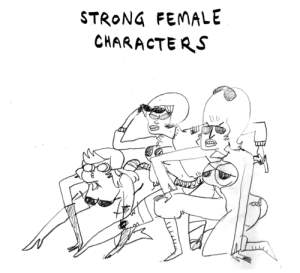I was GOING to possibly talk about The Big Sexy Problem with Superheroines and Their 'Liberated Sexuality' but with most things about women in comics, I know people who can speak to this much better than I do, mostly because they care a lot more and I have become... apathetic about the comic book industry.
Monday, September 26, 2011
Wednesday, September 21, 2011
Tuesday, September 20, 2011
Quantity V. Quality: Are more women on TV enough?
TV this fall seems positively lousy with Women. The word that comes to mind is lousy though, really, because the roles in which we see these women seems somewhat overwhelmingly fetishized. Charlie's Angels, The Playboy Club and Pan Am, a show about Stewardesses (long before flight attendant came to vogue). An interesting article in The Washington Post asks the questions "WHAT THE [EXPLETIVE] HAPPENED TO WOMEN??"
To be clear: This is a vastly mediocre fall TV season in every way, even after I graded it on a curve. It doesn’t do much for men or women (or dinosaurs). It’s a season filled with some zippy ideas that fizzle out within minutes of the first episodes. I expect a lot of quick cancellations.
But what is most striking about it — what critics and pop-culture observers have picked up on — is the surfeit of new shows about women. Others have dubbed it a victory, yet why do the women we meet depress me so? As I watched, the overriding question I’ve written in my notes is, often in exasperated all-caps, is simply this:
WHAT THE [EXPLETIVE] HAPPENED TO WOMEN?
On the plus side, women write and produce and star in more TV than ever. But if the only women you ever saw were those on these shows, you would have a hard time believing that a liberation movement had ever occurred.And without having watched any of these yet, stopping to write the list I wrote above does give me a little pause to ask, is this progress? On one hand, yes, more women on TV and in leading roles is a kind of progress. But as a whole, is it meaningful if the shows are terrible?
It’s all bunnies, baby dolls and broads — and bridezillas and bimbos, if you get into reality TV. It’s still giggles and jiggles.
My, the jiggles. This season’s uncalled-for retread of “Charlie’s Angels” (co-produced by Drew Barrymore yet entirely absent the ironic panache of her 2000 big-screen version) brings the word “jiggle” back into play, though with the 21st century’s predilection for gymnastics and martial arts. This has the effect of making the jiggle seem more lithe and elegant, but it’s not the curves that have gone jello-esque — it’s the brain stem. How is it possible that a “Charlie’s Angels” in 2011 would make the “Charlie’s Angels” of 1976 look like Jane Austen’s “Persuasion”?
Let's ask the bigger question which I think is hinted at beautifully in this article, what are we asking of television that we aren't getting even when we are getting what we thought we wanted?
We seem to want more diversity from our shows and their casts and creators (in this case GENDER diversity), why do we want that? Fairness, piffle, we want things that are legitimately entertaining. If a story is good do we watch it even if we find the creator vile? yes, yes we do.
The fact is that creating a bunch of shows that star women but aren't terribly good does make us ask the question:
If a show stars a woman and it's terrible is it worth watching?
I don't think yogis have to meditate over that Koan for centuries. I think it's pretty clear that it doesn't matter if there are women or men in leading roles if the stories are uninteresting. If these shows are as terrible as the Washington Post describes chances are we won't have to worry about them in the Spring lineup.
At the same time, it's worth considering why these shows might fail and how unsurprising it would be if they did. Television has one thing going for it that the Internet doesn't (yet) the ability to tell a story on a scale and timeline that allows for long-form development and weekly frequency. Charlie's Angels' old audience of young boys who need a jiggle fix can get that elsewhere, and if Pan Am doesn't live up to the quality of Mad Men, people will just watch DVDs of Mad Men.
These are exactly the same reasons terrible shows starring men don't bring people back to the major networks. A Terrible Show is Terrible whether it stars women or not.
Labels:
charlies angels,
fall lineup,
girls and tv,
pan am,
stewardess,
t and a,
women and tv
Thursday, September 1, 2011
Brazil's Telenovelas change lives of women.
Machisma
How a mix of female empowerment and steamy soap operas helped bring down Brazil’s fertility rate and stoke its vibrant economy.
from National Geographic
Subscribe to:
Posts (Atom)






